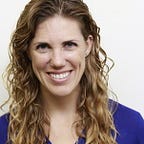Why Peloton Is Winning (and It’s Not COVID)
Thoughts from a Peloton fanatic and leader-in-progress
Messiah leaders are a double-edged sword for organizations. On one hand, they drive loyalty and motivation. But these leaders can also become single points of failure. Peloton made the organizational shift from relying on a Messiah leader in 👑 Robin Arzon to a 💪 team of leaders.
Robin Arzon, vice president and head instructor at Peloton, is an inspiration and a force of nature. When I got my bike in January (ah, the ̶f̶o̶r̶e̶s̶i̶g̶h̶t̶ good luck), she took my post-partum, sleep-deprived body, and spurred me back into shape.
“Someone once told me not to bite off more than I could chew. I said I’d rather choke on greatness than nibble on mediocrity.” — Robin Arzon
God damn, Robin. You make me want to be a better person. Stronger. Allergic to basic. A hustler. A queen. 👑 (You get the picture.)
I bet Peloton leadership is thanking their lucky stars that Robin joined their crew 6 years ago. According to Peloton’s Q4 shareholder letter, their subscriber numbers have doubled (113%) over the last year to 1.09 million. COVID certainly spurred that, but I don’t think they would be seeing the meteoric rise and retention if it weren’t for inspirational leaders like Robin. Through all the crazy twists and turns of this year, Robin has been a rock. Robin has given authentic voice to the wide-spread uncertainty and stress.
In September, Robin announced that she was pregnant. 🎉 👶 Half a million people cheered for her. And I thought: “Well done, Robin and Peloton leadership.” Why? Because Peloton has diversified their base of inspirational instructors. Robin’s pregnancy and likely parental leave is not going to leave them in the lurch, ardent followers left without their Messiah. Yes, we will miss Robin. But we’ll be ok.
I suspect this wasn’t just luck. To move from having one or two beloved leaders, to half a dozen, doesn’t happen by chance. That takes organizational intentionality. Peloton’s success in building out a bench of leaders relies on three key strategies that I’ve noticed smart organizations use throughout my professional life:
1. Coach, and create opportunities.
In July, Peloton hosted “All for One” rides featuring about a dozen of their cycling instructors. Each instructor had a few minutes to introduce themselves and their style through words, music choice, and tempo. It created exposure to new instructors, and lowered the perceived risk of taking a class with an unknown teacher.
When I was preparing to take a new leadership role, I was in a meeting discussing pricing for a new product. My lead slacked me: “You should be the final decision maker, not me. Let’s start changing the norms and having the team orient towards you.” I was coached in real-time (silver lining of virtual meetings!), and encouraged to play a new role.
2. Set new leaders up for success.
Robin and Cody both regularly take time to rave about other instructors and their classes. They share their power, and know that doing so makes them all stronger.
A lead once suggested I “take a liberal definition” of my role, a vote of confidence and invitation to take on more. I ended up leading team all-hands and quarterly business reviews. That lead created space for an association to develop between that product area and the emerging leaders on the team.
3. Encourage emerging leaders to find their authentic style.
Peloton instructors are united in their optimism, energy, and fitness prowess. But how they inspire us to work up a sweat in our living room varies. Alex Toussaint kicks the butts of pro athletes like Cam Newton. Ally Love brings us to church during her Sundays with Love classes. Cody Rigsby lets me feel like I’m in a Castro dance club during shelter-in-place. Tunde Oyeneyin gives voice to systematic racism in a way that many can hear.
Each leader has their own style. We must embrace that to develop a broad base of leaders. It’s what Peloton has done so well this year. They haven’t tried to make Ally become Robin. Or Cody become Alex. They’ve supported each leader in finding success on their own terms. In doing so, Peloton has built their bench of leaders, so that we can truly honor Robin when she becomes a new mom and takes whatever time away she chooses.
*Note: I do not work for Peloton, and I have no special information about their inner workings or how they make decisions. I’m postulating as a customer and net promoter
